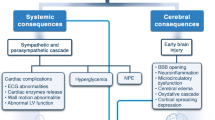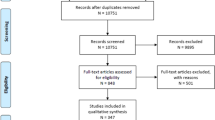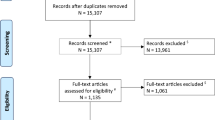Abstract
Background
Oral anticoagulants have been associated with greater hematoma expansion in patients with intracerebral hemorrhage (ICH). The purpose of this study was to determine whether the reported use of antiplatelet agents also results in greater hematoma expansion.
Methods
Retrospective review of patients with spontaneous supratentorial ICH diagnosed within 6 h of onset, who underwent follow-up head CT approximately 48 h later. Digital imaging analysis of initial and second CT scans was performed for comparison of hematoma volume changes between patients reporting and those not reporting antecedent antiplatelet use. Statistical analyses to determine predictors of ICH volume change and in-hospital mortality were also performed via multivariate regression models.
Results
Of the 70 patients included, 17 were documented as taking antiplatelet agents. Groups were comparable regarding baseline demographic, clinical and laboratory characteristics, and the timing of CT scans was similar. Patients reporting antiplatelet use experienced greater absolute increase (7.7 ml vs. 5.5 ml) and proportional increase (110% vs. 21%) in ICH volume than those not reporting antiplatelet use, but these differences were not statistically significant (P = 0.94 and 0.61 respectively; Wilcoxon test). Baseline hematoma volume tended to correlate with percentage volume increase (P < 0.1), whereas IVH was inversely associated with percent volume increase (P < 0.05). Age (P < 0.05), absolute volume increase (P < 0.005), and final volume (P < 0.001) were associated with in-hospital mortality, the rates of which were similar between the two study groups (18% vs. 17%).
Conclusions
Patients reporting antiplatelet use experienced similar degrees of hematoma expansion compared to patients not reporting antiplatelet use.


Similar content being viewed by others
References
Anderson C, Chakera T, Stewart E, Jamrozik K. Spectrum of primary intracerebral hemorrhage in Western Australia 1989–90—incidence and outcome. J Neurol Neurosurg Psychiatry. 1994;57:936–40.
Brott T, Broderick J, Kothari R, Barsan W, Tomsick T, Sauerbeck L, Spilker J, et al. Early hemorrhge growth in patients with intracerebral hemorrhage. Stroke. 1997;28:1–5.
Davis S, Broderick J, Hennerici M, Brun N, Diringer M, Mayer S, Begtrup K, et al. Hematoma growth is a determinant of mortality and poor outcome after intracerebral hemorrhage. Neurology. 2006;66:1175–81.
Broderick J, Diringer M, Hill M, Brun N, Mayer S, Steiner T, Skolnick B, et al. Determinants of intracerebral hemorrhage growth—an exploratory analysis. Stroke. 2007;38:1072–5.
Goldstein J, Fazen L, Snider R, Schwab K, Greenberg S, Smith E, Lev M, et al. Contrast extravasation on CT angiography predicts hematoma expansion in intracerebral hemorrhage. Neurology. 2007;68:889–94.
Flibotte J, Hagan N, O’Donnell J, Greenberg S, Rosand J. Warfarin, hematoma expansion, and outcome of intracerebral hemorrhage. Neurology. 2004;63:1059–64.
Cucchiara B, Steven M, Sansing L, Kasner S, Lyden P. Hematoma growth in oral anticoagulant related intracerebral hemorrhage. Stroke. 2008;39:2993–6.
Huttner H, Peter S, Hartmann M, Kohrmann M, Juettler E, Winker J, Mueller S, et al. Hematoma growth and outcome in treated neurocritical care patients with intracerebral hemorrhage related to oral anticoagulant therapy. Stroke. 2006;37:1465–70.
Toyoda K, Okada Y, Minematsu K, Kamouchi M, Fujimoto S, Ibayashi S, Inoue T. Antiplatelet therapy contributes to acute deterioration of intracerebral hemorrhage. Neurology. 2005;65:1000–4.
Toyoda K, Yasaka M, Nagata K, Nagao T, Gotoh J, Sakamoto T, Uchiyama S, et al. Antithrombotic therapy influences location, enlargement, and mortality from intracerebral hemorrhage. Cerebrovasc Dis. 2008;27:151–9.
Saloheimo P, Ahonen M, Juvela S, Pyhtinen J, Savolainen E, Hillbom M. Regular aspirin use preceding the onset of primary inracerebral hemorrhage is an independent predictor for death. Stroke. 2006;37:129–33.
Sorimachi T, Fujii Y, Morita K, Tanaka R. Predictors of hematoma enlargement in patients with intracerebral hemorrhage treated with rapid administration of antifibrinolytic agents and strict blood pressure control. J Neurosurg. 2007;106:250–4.
Sansing L, Messe S, Cucchiara B, Cohen S, Lyden P, Kasner S. Prior antiplatelet use does not affect hemorrhage growth or outcome after ICH. Neurology. 2009;72(16):1397–402.
Mayer S, Brun N, Begtrup K, Broderick J, Davis S, Diringer M, Skolnick B, et al. Efficacy and safety of recombinant activated factor VII for acute intracerebral hemorrhage. N Eng J Med. 2008;358:2127–37.
Vernooij M, Van der Lugt A, Hofman A, Krestin G, Stricker B, Breteler M. Use of antithrombotic drugs and the presence of cerebral microbleeds—the Rotterdam study. Arch Neurol. 2009;66:714–20.
Naidech AM, Jovanovic B, Liebling S, Garg RK, Bassin SL, Bendok BR, et al. Reduced platelet activity is associated with early clot growth and worse 3-month outcome after intracerebral hemorrhage. Stroke. 2009;40:2398–401.
Naidech A, Bernstein R, Levasseur K, Bassin S, Bendok B, Batjer H, et al. Platelet activity and outcome after intracerebral hemorrhage. Ann Neurol. 2009;65:352–6.
Naidech A, Bassin S, Bernstein R, Batjer H, Alberts M, Lindholm P, et al. Reduced platelet activity is more common than reported antiplatelet medication use in patients with intracerebral hemorrhage. Neurocrit Care. Epub 21 April 2009.
Hallevi H, Albright K, Aronowski J, Barreto A, Schild S, Khaja A, et al. Intraventricular hemorrhage—anatomic relationships and clinical implications. Neurology. 2008;70:848–52.
Sacco S, Marini C, Toni D, Olivieri L, Carolei A. Incidence and 10-year survival of intracerebral hemorrhage in a population based registry. Stroke. 2009;40:394–9.
Broderick J, Brott T, Duldner J, Tomsick T, Huster G. Volume of intracerebral hemorrhage—a powerful and easy to use predictor of 30-day mortality. Stroke. 1993;24:987–93.
Jauch E, Lindsell C, Adeoye O, Khoury J, Barsan W, Broderick J, Panicoli A, et al. Lack of evidence for an association between hemodynamic variables and hematoma growth in spontaneous intracerebral hemorrhage. Stroke. 2006;37:2061–5.
Anderson C, Huang Y, Wang J, Arima H, Neal B, Peng B, et al. Acute blood pressure reduction in acute cerebral hemorrhage trial (INTERACT). Lancet Neurol. 2008;7:391–9.
Broderick J, Connolly S, Feldmann E, Hanley D, Kase C, Krieger D, et al. Guidelines for the management of spontaneous intracerebral hemorrhage in adults. Stroke. 2007;38:2001–23.
Foerch C, Sitzer M, Steinmetz H, Neumann-Haefelin T. Pretreatment with antiplatelet agents is not independently associated with unfavorable outcome in intracerebral hemorrhage. Stroke. 2006;37:2165–7.
Freeman W, Barrett K, Bestic J, Meschia J, Broderick D, Brott T. Computer assisted volumetric analysis compared with ABC/2 method for assessing warfarin related intracranial hemorrhage volumes. Neurocrit Care. 2008;9:307–12.
Author information
Authors and Affiliations
Corresponding author
Rights and permissions
About this article
Cite this article
Moussouttas, M., Malhotra, R., Fernandez, L. et al. Role of Antiplatelet Agents in Hematoma Expansion During The Acute Period of Intracerebral Hemorrhage. Neurocrit Care 12, 24–29 (2010). https://doi.org/10.1007/s12028-009-9290-0
Published:
Issue Date:
DOI: https://doi.org/10.1007/s12028-009-9290-0




